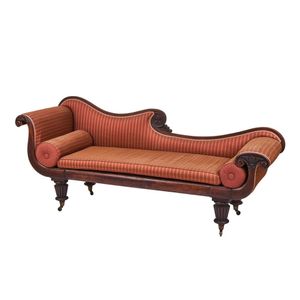An important early Colonial cedar double-end sofa, Tasmanian…
An important early Colonial cedar double-end sofa, Tasmanian circa 1825. on turned and reeded legs with rosette carved back and scroll decorated arms. provenance: The Walsh Bowkett Family Tasmania. Acquired at the auction of The Harry and Christine Wright Collection, Gowan's, Tasmania. 2005 lot 726. The opposing twin sofa is illustrated in "Memories A Survey of the Australian Furniture in the Collection of the Lord McAlpine of West Green by Graham Cornall and is now in the collection of the National gallery of Australia, 222 cm long, 67 cm deep, 96 cm high
You must be a subscriber, and be logged in to view price and dealer details.
Subscribe Now to view actual auction price for this item
When you subscribe, you have the option of setting the currency in which to display prices to $Au, $US, $NZ or Stg.
This item has been sold, and the description, image and price are for reference purposes only.
- Turning - Any part of a piece of furniture that has been turned and shaped with chisels on a lathe. Turned sections include legs, columns, feet, finials, pedestals, stretchers, spindles etc. There have been many varieties and fashions over the centuries: baluster, melon, barley-sugar, bobbin, cotton-reel, rope-twist, and so on. Split turning implies a turned section that has been cut in half lengthwise and applied to a cabinet front as a false decorative support.
- Circa - A Latin term meaning 'about', often used in the antique trade to give an approximate date for the piece, usually considered to be five years on either side of the circa year. Thus, circa 1900 means the piece was made about 1900, probably between 1895 and 1905. The expression is sometimes abbreviated to c.1900.
- Rosette - A stylised circular-shaped disk with turned or carved decoration decoration applied to a surface, or carved into the surface, especially used in ceramics, jewellery, furniture, sculpture and textiles. Also known as a boss or a paterae or patera.
- Provenance - A term used to describe the provable history of an antique or work of art, and thus an additional aid to verifying its authenticity. Provenance can have an inflating effect on the price of an item, particularly if the provenance relates to the early settlement of Australia, a famous person, or royalty. Less significant are previous sales of the item through an auction house or dealer.
- Gallery - On furniture, a gallery is a small upright section, frequently pierced and decorated, around the tops of small items of furniture, such as davenports, side tables, and so forth. Galleries are made in brass or bronze,and be fretted, pierced or solid timber. A three-quarter gallery is one that surrounds three of the four sides of a table, desk or other top.
- Reeding - A series of parallel, raised convex mouldings or bands, in section resembling a series of the letter 'm'. The opposite form of fluting, with which it is sometimes combined. Reeding is commonly found on chair legs, either turned or straight, on the arms and backs of chairs and couches and around table edges in the Neoclassical or Classical Revival manner. Reeding was also used as a form of decoration during the Edwardian period, but it is usually much shallower and evidently machine made.
- Important - Important is a word used in the antique trade to indicate an object should be ranked above other similar objects, and is therefore more valuable.
The object could be considered important because it is by a famous designer or maker, has been shown at a major exhibition, is of exquisite workmanship, is rare or is a "one-off", was made for an important patron, and so on.
Even further up the pecking order are objects that are described in catalogue descriptions as highly important or extraordinarily important.
This item has been included into following indexes:
-
settees and sofas
- Australian 56
- Georgian 38
